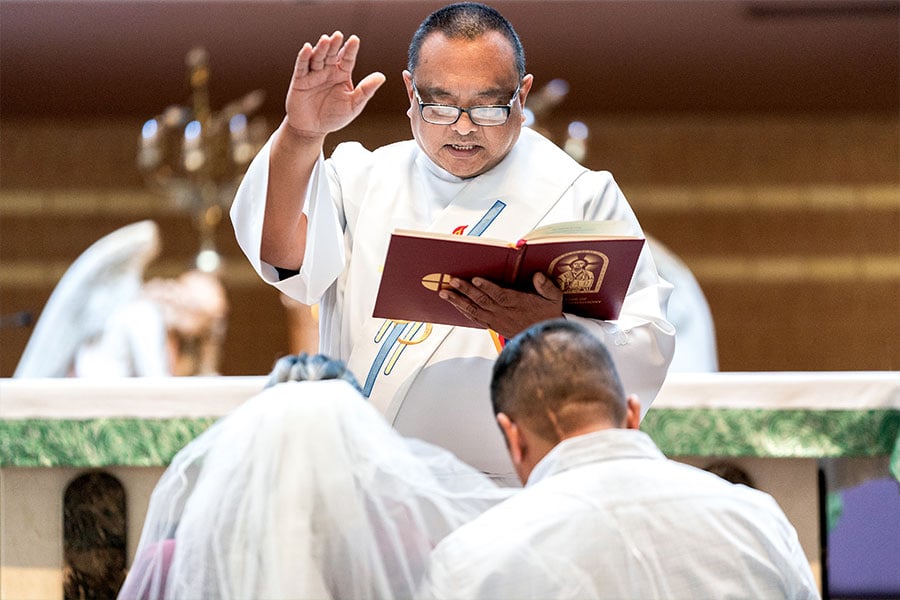Deacon candidates prepare for ordination

Davy Tolentino, a class of 2022 deacon candidate, rehearses how to conduct the Rite of Marriage during a practicum on Nov. 13, 2021 at St. Peter the Apostle Church in Fort Worth. (NTC/Juan Guajardo)
Ten deacon candidates will be ordained to the permanent diaconate on Wednesday, Aug. 10 at 7 p.m. at St. Elizabeth Ann Seton Church in Keller. The Mass will be livestreamed on FWDioc.org.
Before their ordination, they participated in a five-day silent retreat June 8-12. After the retreat, they will meet with Bishop Michael Olson for the final steps on their journey to Holy Orders: the Profession of Faith and the Oath of Fidelity.
For the Diocese of Fort Worth, the process of formation takes six years in total for candidates.
In the first two of these years, a stage called aspirancy, the men attend workshops, seminars, and classes with their wives to discern if they “have the seeds of the vocation to the diaconate,” Director of Diaconal Formation Juan Rendon explained.
After these two years of heavy discernment, they must then petition the bishop for admission to candidacy by writing a letter about their calling.
They are guided by a formation advisor, participate in prayer groups, and are assigned to an annual pastoral outreach such as a hospice, homeless shelter, hospital, prison, or charity, as well as to a parish.
According to Rendon, it is unlike a graduate school program where one might enroll in two or three courses at a time, but instead must focus on a multitude of different dimensions of ordained ministry formation — not only academic, but also pastoral, spiritual, human, intellectual, and vocational.
Rendon defines the diaconate as “a vocation to be at the service of the bishop, to reach out to the peripheries of human experience” and “a vocation to be the charity of Christ in the Church.”
David Kinch first considered the diaconate while praying for vocations with fellow parishioners at St. Andrew Church in Fort Worth after a Mass.
“I remember, at that moment, experiencing a little nudge, a little prompting, saying that I could do this,” Kinch said.
Kinch said he hopes to serve wherever there is the greatest need.
Alfred Mosco first considered the diaconate because of the witness of Deacon Klaus Gutbier at Good Shepherd Parish in Colleyville, but he calls the process the “work of the Holy Spirit.”
“Part of the beauty of our Church is just the mystery of the Holy Spirit and how it works all throughout the mystical body of Christ,” Mosco said. “I think that it’s very, very hard to put into words, but I really think it was at the prompting of the Holy Spirit. I think it was a calling for me to at least get into inquiry and then to continue to invite the Holy Spirit into the journey and let it guide me.”
